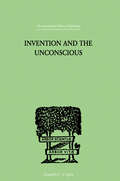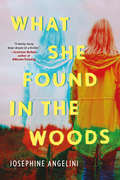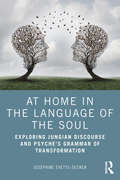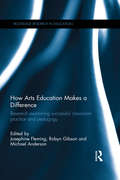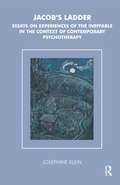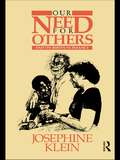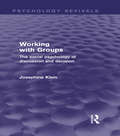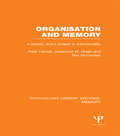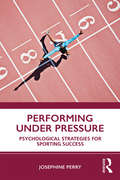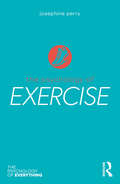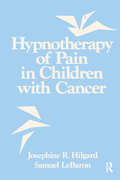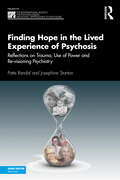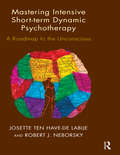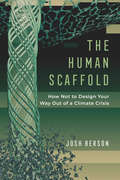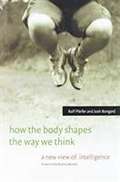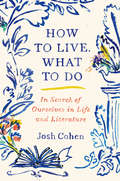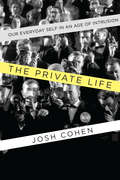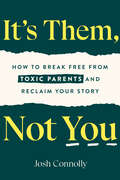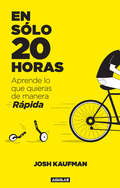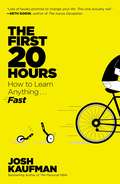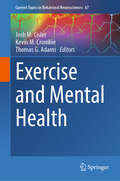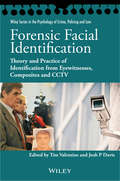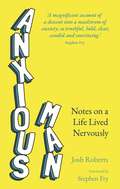- Table View
- List View
Invention And The Unconscious (International Library Of Psychology Ser.)
by Joseph-Marie MontmassonThis is Volume X in a series of twenty-one in a collection on Cognitive Psychology. Originally published in 1931, in this book, M. Montmasson is concerned to demonstrate a fact of the first importance, easily overlooked. The fact is this, that human inventions in the widest sense of the word, are products of the unconscious.
What She Found in the Woods
by Josephine AngeliniFor readers of psychological thriller books and wilderness survival stories, a gripping thriller about Magda who's desperate to get over a scandal at her New York private school. Fans of We Were Liars and A Good Girl's Guide to Murder will find themselves swept up in What She Found in the Woods!This is Magda's last chance. Recovering from a scandal at her elite New York City private school that threw life into a tailspin, she is shipped off to live with her grandparents in the Pacific Northwest for the summer.Medicated and uninspired, Magda spends her days in a fog wandering the forest behind the house. But then she stumbles upon Bo. He's wild and free, and he can see the real her. Magda starts believing she might be able to move on from her past and feel something again. But there's more to this sleepy town than she thought. And what Magda finds in the woods near Bo's forest home is the beginning of a whole new nightmare...Perfect for those looking for: Mental health books for teens An engaging mystery with an unreliable narrator Young adult thriller books A novel to keep you on your toes if a teen killer is out in the woods Suspense books
At Home In The Language Of The Soul: Exploring Jungian Discourse and Psyche’s Grammar of Transformation
by Josephine Evetts-SeckerLanguage has a primary importance in Jungian psychology and its practice. C. G. Jung saw every act of speech as a psychic event. Even the "worker" words in language, like prepositions or conjunctions, carry particular archetypal energies, working dynamically and daimonically in the conduct of transformational narrative and realizing both personal and collective purposes. This book aims to deepen our consciousness of psyche’s speech as it occurs in our professional discourses, in the psychoanalytic encounter, in dreams, fairy tales, myths and poetry. Vividly exploring the grammar of psyche, we are urged to constantly kindle and rekindle our engagement with language.
How Arts Education Makes a Difference: Research examining successful classroom practice and pedagogy (Routledge Research in Education)
by Michael Anderson Josephine Fleming Robyn GibsonThis book presents ground-breaking research on the ways the Arts fosters motivation and engagement in both academic and non-academic domains. It reports on mixed method, international research that investigated how the Arts make a difference in the lives of young people. Drawing on the findings of a longitudinal quantitative study led by the internationally renowned educational psychologist Andrew Martin, the book examines the impact of arts involvement in the academic outcomes of 643 students and reports on the in-depth qualitative research that investigates what constitutes best-practice in learning and teaching in the Arts. The book also examines drama, dance, music, visual arts and film classrooms to construct an understanding of quality pedagogy in these classrooms. With its evidence-based but highly accessible approach, this book will be directly and immediately relevant to those interested in the Arts as a force for change in schooling. How Arts Education Makes a Difference discusses: The Arts Education, Motivation, Engagement and Achievement Research Visual Arts, Drama and Music in Classrooms Technology-mediated Arts Engagement International Perspectives on Arts and Cultural Policies in Education This book is a timely collation of research and experiential findings which support the need to promote arts education in schools worldwide. It will be particularly useful for educationists, researchers in education and arts advocates.
Doubts and Certainties in the Practice of Psychotherapy
by Josephine KleinThis book is a collection of occasional papers on the practice of psychotherapy for pre-qualification students and for more experienced professionals, focusing on the development of some psychoanalytic theories into their social and historical context.
Jacob's Ladder: Essays on Experiences of the Ineffable in the Context of Contemporary Psychotherapy
by Josephine KleinThis book considers mysticism – a world of ineffable experience – to see if it might have anything to teach those in the therapeutic world, invites the reader to look at newer ways of psychoanalytic thinking, and uses writers of the past to help illuminate contemporary issues.
Our Needs for Others and Its Roots in Infancy
by Josephine KleinIn this original and highly readable book Josephine Klein provides a detailed picture of how young infants experience life and how this lays the foundations for later personality structures.
Working with Groups: The Social Psychology of Discussion and Decision (Psychology Revivals)
by Josephine KleinOriginally published in 1963, this book was one of the first to explore group process and working with groups. The introductory chapter tells us that working with groups requires three skills: and understanding of theory, a knowledge of its application, and trained experience in its use. It goes on to discuss these points, helping the reader towards an understanding of group processes and making decisions in groups. This title is an early example of author’s explorations of groups and group work, which were to be a major factor in the establishment of group-work practice in Britain over the following years.
Organisation and Memory: A Review and a Project in Subnormality (Psychology Library Editions: Memory)
by Peter Herriot Roy McConkey Josephine M. GreenOriginally published in 1973, this volume looks at the organisation of memory data in, what at the time was termed, ‘mental handicap’. The first part surveys recent work in this important area, giving a general account of experiments and findings. The second part reports a particular piece of research on memory in people with learning difficulties, then called ‘subnormal individuals’. Very much of its time, in terms of the terminology, this was an important book for anyone concerned with people with intellectual disabilities and for experimental psychologists involved with the processes of memory.
Performing Under Pressure: Psychological Strategies for Sporting Success
by Josephine PerryPerforming Under Pressure is an essential resource on improving sporting performance in high-pressure situations. Perry’s work guides coaches and athletes through nine key elements of the sporting mindset to help athletes to perform at the highest standards, even under the most pressurized of situations. This valuable read includes empirically-based advice on areas such as embracing competition; building confidence, concentration and focus; maintaining emotional control; learning from and coping with failure or injury; being braver; and being able to push harder. Perry also provides 64 strategies to support each sporting mindset, offering not just the evidence as to why they work but exactly how to implement them. This book uniquely offers those supporting athletes a toolkit of sport psychology strategies and interventions in a way that is evidence-based, accessible and engaging, whether you are starting out studying sport psychology, on a sports science course, or are a coach of many years' standing, for both elite and amateur athletes.
The Psychology of Exercise (The Psychology of Everything)
by Josephine PerryWhy should we exercise? When should we exercise? Why don’t we exercise? The Psychology of Exercise separates fact from fiction, delving into key theories, ideas, and the impact of life stages on when, why, and how we exercise. It explores the barriers and motivators to exercise for children, teenagers, adults, and retirees as well as for those living with a chronic health condition. It shows how when we personalise activity programmes, exercise becomes a life-affirming, life-lengthening habit. Using real-life case studies from those who work with exercisers at all levels, The Psychology of Exercise shows us the huge value that comes from exercising in every stage of our lives.
Hypnotherapy Of Pain In Children With Cancer
by Josephine R. Hilgard Samuel LeBaronPresents findings on the effects of hypnosis in reducing anxiety and pain in children with cancer and suggests that hypnotherapy offers real promise of pain relief without drugs.First published in 1991. Routledge is an imprint of Taylor & Francis, an informa company.
Finding Hope in the Lived Experience of Psychosis: Reflections on Trauma, Use of Power and Re-visioning Psychiatry (The International Society for Psychological and Social Approaches to Psychosis Book Series)
by Patte Randal Josephine StantonThis book offers first-person accounts of the experience of psychosis from the inside and the outside, through the eyes of two doctors, one of whom has experienced psychosis and both of whom have worked for decades in the field of psychiatry. Underpinned by rigorous academic analysis using an evocative duo-ethnographic approach, the book explores the cultural and subcultural influences from childhood onwards – both traumatic and resilience-building – that have shaped their lives. Both authors reflect on strategies they learned early in life for dealing with challenges, each managing to function at a high level while avoiding awareness of their vulnerability. They reflect on the potential dangers of using their expertise and position of power in psychiatry simply to diagnose mental illness and prescribe medication. The differences and similarities in the authors’ stories provide a productive tension highlighting the complexities of this paradigm shift that is happening in psychiatry. Written in the form of two interacting memoirs, this book is of great interest to researchers, clinicians, and practicing psychologists, as well as a general audience with interest in psychosis.
Mastering Intensive Short-Term Dynamic Psychotherapy: A Roadmap to the Unconscious
by Robert J. Neborsky Josette Ten Have-De LabijeThis book evolved from the First International Meeting of the Experiential Dynamic Psychotherapy Association on intensive short-term dynamic psychotherapy. It will help readers to make use of the conscious working alliance with the patient to increase the unconscious part of the working alliance.
The Human Scaffold: How Not to Design Your Way Out of a Climate Crisis (Great Transformations #2)
by Josh BersonHumanity has precipitated a planetary crisis of resource consumption—a crisis of stuff. So ingrained is our stuff-centric view that we can barely imagine a way out beyond substituting a new portmanteau of material things for the one we have today.In The Human Scaffold, anthropologist Josh Berson offers a new theory of adaptation to environmental change. Drawing on niche construction, evolutionary game theory, and the enactive view of cognition, Berson considers cases in the archaeology of adaptation in which technology in the conventional sense was virtually absent. Far from representing anomalies, these cases exemplify an enduring feature of human behavior that has implications for our own fate.The time has come to ask what the environmental crisis demands of us not as consumers but as biological beings. The Human Scaffold offers a starting point.
How The Body Shapes The Way We Think: A New View Of Intelligence
by Rolf Pfeifer Josh BongardHow could the body influence our thinking when it seems obvious that the brain controls the body? In How the Body Shapes the Way We Think, Rolf Pfeifer and Josh Bongard demonstrate that thought is not independent of the body but is tightly constrained, and at the same time enabled, by it. They argue that the kinds of thoughts we are capable of have their foundation in our embodiment--in our morphology and the material properties of our bodies. <P><P> This crucial notion of embodiment underlies fundamental changes in the field of artificial intelligence over the past two decades, and Pfeifer and Bongard use the basic methodology of artificial intelligence--"understanding by building"--to describe their insights. If we understand how to design and build intelligent systems, they reason, we will better understand intelligence in general. In accessible, nontechnical language, and using many examples, they introduce the basic concepts by building on recent developments in robotics, biology, neuroscience, and psychology to outline a possible theory of intelligence. They illustrate applications of such a theory in ubiquitous computing, business and management, and the psychology of human memory. Embodied intelligence, as described by Pfeifer and Bongard, has important implications for our understanding of both natural and artificial intelligence.
How to Live. What to Do: In Search of Ourselves in Life and Literature
by Josh CohenA brilliant psychoanalyst and professor of literature invites us to contemplate profound questions about the human experience by focusing on some of the best-known characters in literature—from how Virginia Woolf&’s Mrs. Dalloway copes with the inexorability of midlife disappointment to Ruth's embodiment of adolescent rebellion in Kazuo Ishiguro&’s Never Let Me Go. &“So beautiful ... a fantastic book.&” —Zadie Smith, best-selling author of White TeethIn supple and elegant prose, and with all the expertise and insight of his dual professions, Josh Cohen explores a new way for us to understand ourselves. He helps us see what Lewis Carroll&’s Alice and Harper Lee&’s Scout Finch can teach us about childhood. He delineates the mysteries of education as depicted in Jane Eyre and as seen through the eyes of Sandy Stranger in The Prime of Miss Jean Brodie. He discusses the need for adolescent rebellion as embodied in John Grimes in James Baldwin&’s Go Tell It on the Mountain and in Ruth in Kazuo Ishiguro&’s Never Let Me Go. He makes clear what Goethe&’s Young Werther and Sally Rooney&’s Frances have—and don&’t have—in common as they experience first love; how Middlemarch&’s Dorothea Brooke deals with the vicissitudes of marriage. Vis-a-vis old age and death, Cohen considers what wisdom we may glean from John Ames in Marilynne Robinson&’s Gilead and from Don Fabrizio in Giuseppe Tomasi di Lampedusa&’s The Leopard.Featuring: • Alice—Lewis Carroll, Alice's Adventures in Wonderland / Through the Looking Glass • Scout Finch—Harper Lee, To Kill a Mockingbird • Jane Eyre—Charlotte Brontë, Jane Eyre • John Grimes—James Baldwin, Go Tell It on the Mountain • Ruth—Kazuo Ishiguro, Never Let Me Go • Vladimir Petrovitch—Ivan Turgenev, First Love • Frances—Sally Rooney, Conversations with Friends • Jay Gatsby—F. Scott Fitzgerald, The Great Gatsby • Esther Greenwood—Sylvia Plath, The Bell Jar • Clarissa Dalloway—Virginia Woolf, Mrs. Dalloway • And more!
The Private Life: Our Everyday Self in an Age of Intrusion
by Josh CohenWith social networking and reality television, self-help columns and daytime talk shows, there's an infinite array of platforms to both expose our deepest thoughts and examine the thoughts of others. In this age of non-stop communication, one's privacy is subject to unrelenting examination, intrusion, and attack from the media, the government, friends, family, and complete strangers.So what are we trying to hide? And what are we trying to find out about others? Practicing psychoanalyst and professor of literature Josh Cohen tackles those questions in his study of privacy and personality, the "most vulnerable and indestructible region of your self." Using Sigmund Freud's theories on identity and the ego as a foundation, Cohen weaves through time and place to study an extensive variety of people who unearthed and revealed the rawest form of their selves. From Adam and Eve to the ballerinas in the hit 2010 film Black Swan, from Hester Prynne to British celebrity Katie Price, Cohen finds Freud's ideas in both fiction and reality alike.Yet even with all the times that we've exposed the inner workings of our psyches, Cohen is sure to emphasize that some part of every individual will always remain hidden. Like Freud once wrote, "The ego is not master in its own house." In a culture that floods our lives with light, how is it that we remain so helplessly in the dark?
It's Them, Not You: How to Break Free from Toxic Parents and Reclaim Your Story
by Josh ConnollyA life-affirming manual on how to confront toxic family dynamics and find emotional freedom from your past.How many times have you heard that family is sacred, even when your reality is different? Resilience and well-being coach Josh Connolly knows statements like &“You&’ll miss them when they&’re gone&” or &“Blood is thicker than water&” doesn&’t apply to everyone. With candor and compassion, he tackles the harsh reality of toxic family dynamics and provides the tools you need to deal with emotionally immature parents It's Them, Not You helps you get unstuck and overcome past trauma, with: A deeply validating breakdown of how toxic parents operate and empowering tips to set clear boundaries that stick A step-by-step recovery process that combines breathwork with inner child healing and other therapeutic methodologies. Exercises and journaling prompts that support cognitive and emotional healing with deep reflection and self-compassion. Links to videos for guided conscious breathwork sessions to reconnect the mind and body and release stuck trauma safely. Whether your solution is to go &“no contact,&” place new boundaries, or reconnect with community, this book is the ultimate handbook to reclaim your agency and freedom.
En sólo 20 horas. Aprende lo que quieras de forma rápida: Aprende lo que quieras de forma rápida
by Josh Kaufman"Algún día cuando tenga tiempo lo haré" ¿Lo has dicho? Aprende a usar tu tiempo.Sacude tu lista de pendientes y obtén las herramientas para desarrollar tu destreza en tiempo record. En sólo 20 horas ofrece un enfoque sistemático para la rápida adquisición de habilidades: cómo aprender cualquier habilidad nueva lo antes posible. Su método muestra cómo simplificar habilidades complejas, maximizar la práctica productiva, y eliminar las barreras de aprendizaje. Con tan sólo 20 horas de práctica enfocada y constante, irás de saber absolutamente nada a realizar algo notablemente bien.Este método no es teórico: es probado sobre el terreno. Josh Kaufman invita a los lectores a poner en práctica el método #ya sea para aprender programación, practicar algún deporte, tocar un instrumento, estudiar un nuevo idioma, o conocer el juego de mesa más antiguo y más complejo del mundo. Y tú, ¿Qué quieres aprender hoy?
The First 20 Hours: How to Learn Anything . . . Fast!
by Josh KaufmanForget the 10,000 hour rule-- what if it's possible to learn the basics of any new skill in 20 hours or less?<P> Take a moment to consider how many things you want to learn to do. What's on your list? What's holding you back from getting started? Are you worried about the time and effort it takes to acquire new skills--time you don't have and effort you can't spare?<P> Research suggests it takes 10,000 hours to develop a new skill. In this nonstop world when will you ever find that much time and energy? To make matters worse, the early hours of practicing something new are always the most frustrating. That's why it's difficult to learn how to speak a new language, play an instrument, hit a golf ball, or shoot great photos. It's so much easier to watch TV or surf the web...<P> In The First 20 Hours, Josh Kaufman offers a systematic approach to rapid skill acquisition-- how to learn any new skill as quickly as possible. His method shows you how to deconstruct complex skills, maximize productive practice, and remove common learning barriers. By completing just 20 hours of focused, deliberate practice you'll go from knowing absolutely nothing to performing noticeably well.<P> Kaufman personally field-tested the methods in this book. You'll have a front row seat as he develops a personal yoga practice, writes his own web-based computer programs, teaches himself to touch type on a nonstandard keyboard, explores the oldest and most complex board game in history, picks up the ukulele, and learns how to windsurf. Here are a few of the simple techniques he teaches:<P> * Define your target performance level: Figure out what your desired level of skill looks like, what you're trying to achieve, and what you'll be able to do when you're done. The more specific, the better.<P> * Deconstruct the skill: Most of the things we think of as skills are actually bundles of smaller subskills. If you break down the subcomponents, it's easier to figure out which ones are most important and practice those first.<P> * Eliminate barriers to practice: Removing common distractions and unnecessary effort makes it much easier to sit down and focus on deliberate practice.<P> * Create fast feedback loops: Getting accurate, real-time information about how well you're performing during practice makes it much easier to improve.<P> Whether you want to paint a portrait, launch a start-up, fly an airplane, or juggle flaming chainsaws, The First 20 Hours will help you pick up the basics of any skill in record time . . . and have more fun along the way.
Exercise and Mental Health (Current Topics in Behavioral Neurosciences #67)
by Josh M. Cisler Kevin M. Crombie Thomas G. AdamsThis edited volume describes key domains of the emerging research literature linking exercise and mental health. The volume is divided into three sections. The first section provides an overview of foundational knowledge regarding basic processes of exercise, including neurocircuitry, neurotransmitter, and immunology systems. The second section describes emerging research on the acute impact of exercise on affect, mood, and cognition. The third section explores the role of exercise in the etiology and treatment of related mental and physical health disorders, including depression, PTSD, eating disorders, and autoimmune disorders. Collectively, this volume provides readers with foundational knowledge of what exercise is, the basic brain, behavioral and cognitive processes engaged by exercise, and a role of exercise in developing and treating mental health disorders.
Forensic Facial Identification: Theory and Practice of Identification from Eyewitnesses, Composites and CCTV (Wiley Series in Psychology of Crime, Policing and Law)
by Tim Valentine Josh P DavisForensic Facial Identification discusses the latest scientific and technical advancements in the field and their implications for practice in psychology, criminology, and law. Provides an up-to-date set of best practices for forensic facial identification Reviews current procedures for different facial identification methods and their reliability Covers eyewitness testimony, line-ups, facial composites, anthropological face reconstructions, CCTV images, and computerized automatic face recognition systems Incorporates case studies which put the latest research and technology in the proper legal context
Anxious Man: Notes on a life lived nervously
by Josh Roberts"So truthful, bold, clear, candid and convincing that I read it in one breathless sitting" Stephen FryOne night three years ago Josh Roberts went to a party. The next morning he awoke to discover his mind had collapsed.In a matter of days he went from being a fun loving, seemingly successful twenty-something to a hot mess of tears and nerves. Eventually he was diagnosed with Generalised Anxiety Disorder (GAD). Since then, he's been mending his mind, rediscovering happiness and learning to live his nervous life. Anxious Man is the story of all this.Told with originality, wit and great humour, it's an essential guide for mental health and a thought-provoking exploration of the millennial condition.***************"The best book I have ever written" Josh Roberts (debut author of Anxious Man)"Yep, fine" Cali Mackrill (girlfriend of author of Anxious Man)"Have you seen my scissors?" Vicky Roberts (mother of author of Anxious Man)
Anxious Man: Notes on a life lived nervously
by Josh Roberts"So truthful, bold, clear, candid and convincing that I read it in one breathless sitting" Stephen FryOne night three years ago Josh Roberts went to a party. The next morning he awoke to discover his mind had collapsed.In a matter of days he went from being a fun loving, seemingly successful twenty-something to a hot mess of tears and nerves. Eventually he was diagnosed with Generalised Anxiety Disorder (GAD). Since then, he's been mending his mind, rediscovering happiness and learning to live his nervous life. Anxious Man is the story of all this.Told with originality, wit and great humour, it's an essential guide for mental health and a thought-provoking exploration of the millennial condition.***************"The best book I have ever written" Josh Roberts (debut author of Anxious Man)"Yep, fine" Cali Mackrill (girlfriend of author of Anxious Man)"Have you seen my scissors?" Vicky Roberts (mother of author of Anxious Man)'This is a funny, refreshingly jargon free book.' Daily Mail
